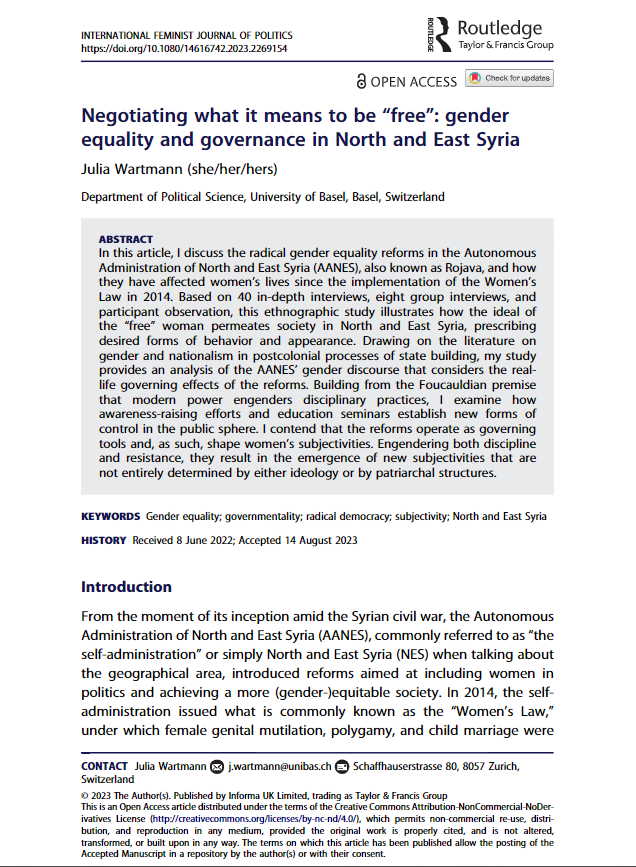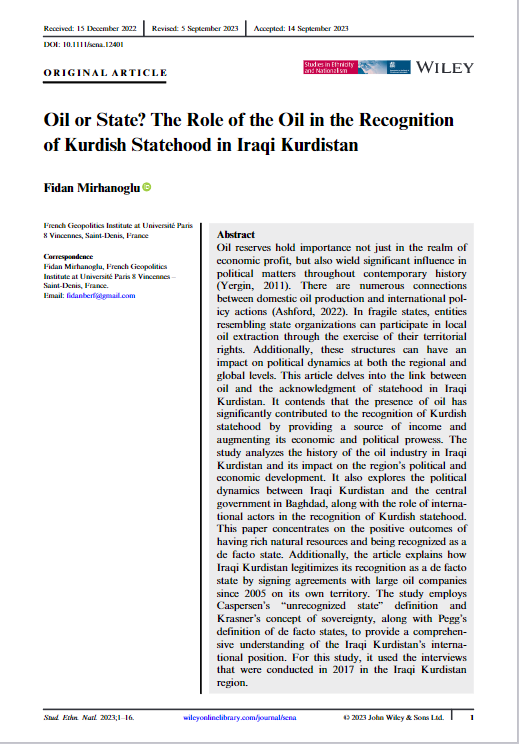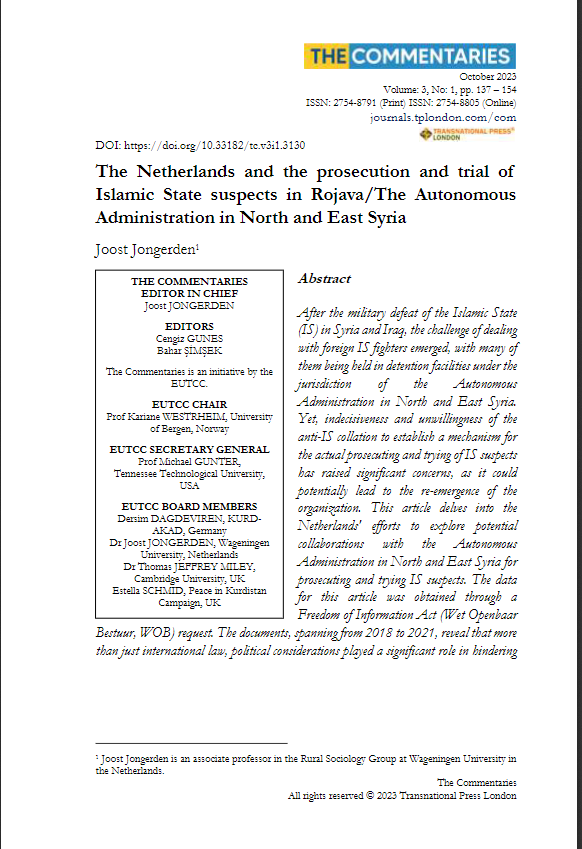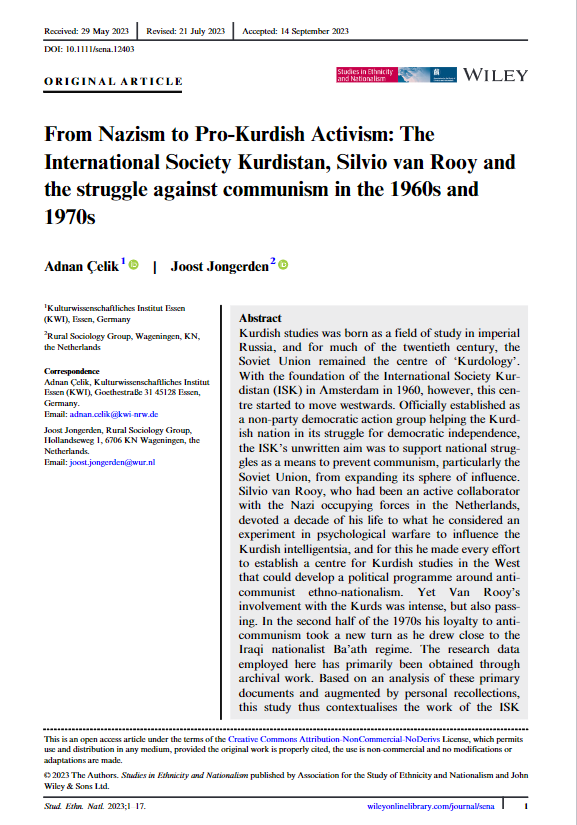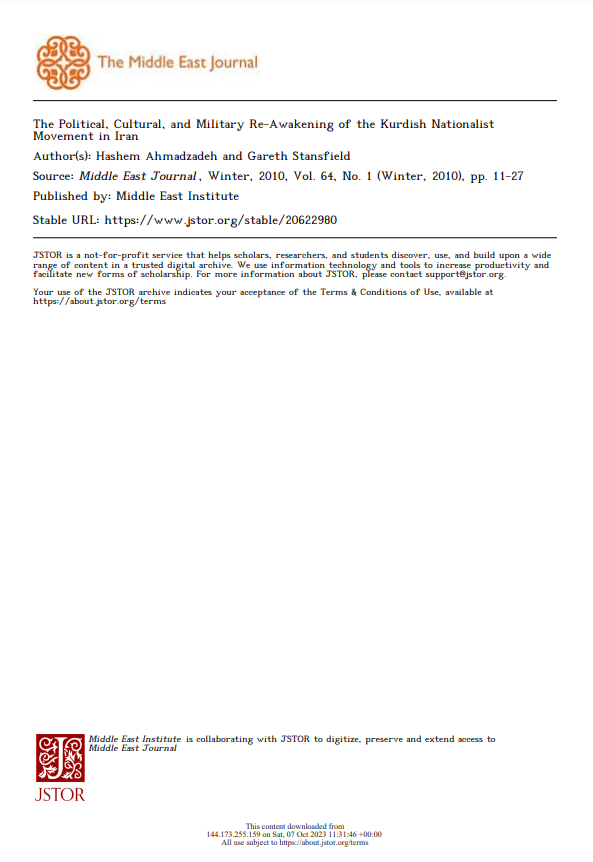Ahmed, M. M. (2016). Iraqi Kurds and nation-building. Springer.
Alaaldin, R. (2021, May 28). Imperfect Allies and non-state actors: Lessons from the 1991 no-fly zone in Iraq. Brookings. https://www.brookings.edu/blog/order-from-chaos/2021/05/28/imperfect-allies-and-non-state-actors-lessons-from-the-1991-no-fly-zone-in-iraq/
Appadurai, A. (1996). Modernity at large: Cultural dimensions of globalization. University of Minnesota Press.
Ashford, E. (2022). Oil, the state, and war: The foreign policies of Petrostates. Georgetown University Press.
Atarodi, H. (2003). Great powers, oil and the Kurds in Mosul: (Southern Kurdistan/Northern Iraq), 1910-1925. University Press of Amer.
Basedau, M., & Lay, J. (2009). Resource curse or rentier peace? The ambiguous effects of oil wealth and oil dependence on violent conflict. Journal of Peace Research, 46(6), 757–776. https://doi.org/10.1177/0022343309340500
Bois, T. (1966). The Kurds. Khayats.
Cable: 06OSLO2_a. (n.d.). WikiLeaks. Retrieved March 31, 2023, from https://wikileaks.org/plusd/cables/06OSLO2_a.html
Caspersen, N. (2012). Unrecognized states: The struggle for sovereignty in the modern international system. Cambridge: Polity Press.
Chaliand, G. (1993). A people without a country: The Kurds and Kurdistan.
Colgan, J. D. (2010). Oil and revolutionary governments: Fuel for international conflict. International Organization, 64(4), 661–694. https://doi.org/10.1017/s002081831000024x
Farooq, U. (2022, January 19). Turkey: Kirkuk-Ceyhan pipeline operational after fire put out. Breaking News, World News and Video from Al Jazeera. https://www.aljazeera.com/news/2022/1/19/turkey-pipeline-operational-after-fire-extinguished
Fieldhouse, D. K. (2006). Western imperialism in the Middle East 1914-1958. Oxford University Press.
Florian, A., & Zamel, D. (2021, November 3). The oil and gas law review. The Law Reviews. https://thelawreviews.co.uk/title/the-oil-and-gas-law-review/iraqi-kurdistan
Foucault, M. (2009). Security, territory, population: Lectures at the college de France 1977-1978. Macmillan.
Geldenhuys, D. (2009). Contested states in world politics. https://doi.org/10.1057/9780230234185
Giddens, A. (1987). The nation-state and violence: Volume 2 of a contemporary critique of historical materialism. University of California Press.
Gunter, M. M. (1999). The Kurdish predicament in Iraq: A political analysis. Palgrave Macmillan.
Gurses, M. (2009). State-sponsored development, oil and democratization. Democratization, 16(3), 508–529. https://doi.org/10.1080/13510340902884622
Hama, H. H., & Jasim, D. (2017). The Loss of Disputed Territories: What Is Next for the Kurdistan Region. Middle East Review of International Affairs, 21(2), 59.
Hannum, H. (1996). Autonomy, sovereignty, and self-determination: The accommodation of conflicting rights. University of Pennsylvania Press. https://doi.org/10.9783/9780812202182
Hasan Hama, H., & Hassan Abdulla, F. (2019). Kurdistan’s referendum: The withdrawal of the Kurdish forces in Kirkuk. Asian Affairs, 50(3), 364–383. https://doi.org/10.1080/03068374.2019.1636522
Hasan, Q. M. (2019). The power of constitution for enacting energy law and managing natural resources: The case of the Kurdistan regional government’s oil contracts. Energy Policy, 128, 744–751. https://doi.org/10.1016/j.enpol.2019.01.012
Humphreys, M. (2005). Natural resources, conflict, and conflict resolution. Journal of Conflict Resolution, 49(4), 508–537. https://doi.org/10.1177/0022002705277545
James, Boris. (2016). Revue L’Histoire, dossier special « Les Kurdes: Mille ans sans etat », Novembre 2016. Les clés du Moyen-Orient. https://www.lesclesdumoyenorient.com/Revue-L-Histoire-Dossier-special-Les-Kurdes-Mille-ans-sans-Etat-novembre-2016.html
Kingston, P., & Spears, I. S. (2004). Conclusions and policy Options Paul Kingston. In P. Kingston, & I. S. Spears (Eds.), States-within-states. New York: Palgrave Macmillan. https://doi.org/10.1057/9781403981011_12
Kolstø, P. (2006). The sustainability and future of unrecognized quasi-states. Journal of Peace Research, 43(6), 723–740. https://doi.org/10.1177/0022343306068102
Krasner, S. D. (1999). Sovereignty: Organized hypocrisy. Princeton University Press.
Mills, R. (2016). Under the mountains. https://doi.org/10.26889/9781784670498
Murtazashvili, J. (2014). Iraqi federalism and the Kurds: Learning to live together, by Alex Danilovich. Publius: The Journal of Federalism, 45(1), e1–e1. https://doi.org/10.1093/publius/pju042
Mustafa, G. (2021, April 21). Iraqi Kurdistan’s bid for independence: Challenges and prospects. Arab Center Washington DC. https://arabcenterdc.org/resource/iraqi-kurdistans-bid-for-independence-challenges-and-prospects/
Natural Resource Governance Institute. (n.d.). https://resourcegovernance.org/sites/default/files/052706.pdf
Nina, C. (2013). unrecognized states. The struggle for sovereignty in the modern international system. Cambridge: Polity press, 2012, 210pp. £16.99 (pbk), £55.00 (hbk). Nations and Nationalism, 19(4), 820–821. https://doi.org/10.1111/nana.12047_2
O’Driscoll, D., & Baser, B. (2019). Independence referendums and nationalist rhetoric: The Kurdistan region of Iraq. Third World Quarterly, 40(11), 2016–2034. https://doi.org/10.1080/01436597.2019.1617631
Okruhlik, G. (1999). Rentier wealth, unruly law, and the rise of opposition: The political economy of oil states. Comparative Politics, 31, 295–315.
Owtram, F. (2018). The state we’re in. In M. Gunter (Ed.), Routledge handbook on the Kurds (1st ed.). Routledge. https://doi.org/10.4324/9781315627427-23
Palani, K., Khidir, J., Dechesne, M., & Bakker, E. (2019a). Strategies to gain international recognition: Iraqi Kurdistan’s September 2017 referendum for independence. Ethnopolitics, 20(4), 406–427. https://doi.org/10.1080/17449057.2019.1596467
Palani, K., Khidir, J., Dechesne, M., & Bakker, E. (2019b). The development of Kurdistan’s de facto statehood: Kurdistan’s September 2017 referendum for independence. Third World Quarterly, 40(12), 2270–2288. https://doi.org/10.1080/01436597.2019.1619452
Palani, K., Khidir, J., Dechesne, M., & Bakker, E. (2020). De facto states engagement with parent states: Kurdistan’s engagement with the Iraqi government. British Journal of Middle Eastern Studies, 48(4), 770–788. https://doi.org/10.1080/13530194.2020.1714429
Park, B., Jongerden, J., Owtram, F., & Yoshioka, A. (2017). On the independence referendum in the Kurdistan region of Iraq and disputed territories in 2017. Kurdish Studies, 5(2), 199–214. https://doi.org/10.33182/ks.v5i2.445
Parker, G. (2014). Western geopolitical thought in the twentieth century. Routledge.
Pegg, S. (1998). International society and the de Facto state ( 1st ed.). Routledge. https://doi.org/10.4324/9780429354847
Pegg, S. (2019). The de facto state in international society. International Society and the De Facto State, 173–203. https://doi.org/10.4324/9780429354847-7
Ross, M. L. (2001). Does oil hinder democracy? World Politics, 53(3), 325–361. https://doi.org/10.1353/wp.2001.0011
Schwarz, R. (2012). War and State Building in the Middle East. Gainesville, FL. https://doi.org/10.5744/florida/9780813037929.001.0001
Simmons, A. J. (2020). The Lockean theory of rights. Princeton University Press.
Smith, B. (2017). Resource wealth as rent leverage: Rethinking the oil–stability nexus. Conflict Management and Peace Science, 34(6), 597–617. https://doi.org/10.1177/0738894215609000
Stansfield, G. R. (2003). Iraqi Kurdistan: Political development and emergent democracy. Routledge.
Who are the Kurds? (2019, October 15). BBC News. https://www.bbc.com/news/world-middle-east-29702440
Wilkenfeld, Y. (2022, June 17). Iraq at a crossroads: Kurdish energy competition with Iran. GIS Reports. https://www.gisreportsonline.com/r/kurdish-energy-competition-iran/
Yergin, D. (2011). The quest: Energy, security, and the remaking of the modern world. Penguin.
Zedalis, R. J. (2009). The legal dimensions of oil and gas in Iraq. https://doi.org/10.1017/cbo9780511596926
المركز العربي للأبحاث ودراسة السياسات. (n.d.). https://www.dohainstitute.org/en/PoliticalStudies/Pages/Kurdistan’sStruggleforSovereigntyState,Societal,andHumanSecurity.aspx
